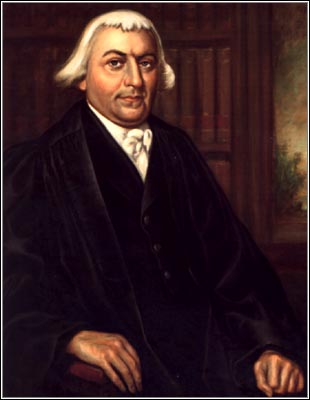James Iredell (James Iredell)

James Iredell was born in Lewes, England, the oldest of five surviving children of Francis Iredell, a Bristol merchant and his wife, the former Margaret MucCulloh of Ireland. The failure of his father’s business (and health) impelled James to immigrate to the Colonies in 1767 at the age of 17. Relatives assisted him in obtaining a position in the customs service as deputy collector, or comptroller, of the port of Edenton, North Carolina. While working at the customs house, Iredell read law under Samuel Johnston (later governor of North Carolina), began the practice of law and was admitted to the bar in 1771. The grandson of a clergyman, James Iredell was a devout Anglican throughout his life and his writings display an interest in spirituality and metaphysics beyond a simple attachment to organized religion. In 1773, Iredell married Johnston’s sister Hannah and the two had four children after twelve childless years. In 1774 he was made collector for the port. On February 8, 1790, George Washington nominated James Iredell to the post of Associate Justice of the Supreme Court and on May 12 he was confirmed by the United States Senate, and received his commission the same day. At the age of 38, Iredell was the youngest of the early Supreme Court Justices. The case load of the first Supreme Court was light. In fact, the court did not hear its first case until 1791 when it decided West v. Barnes. The decision was unanimous, but Iredell requested that Congress change the harsh statute governing the West decision. The Justices gathered to hear arguments only twice a year, and we have only a handful of opinions written by Justice Iredell in his years on the court.
In the Chisholm case, public and political opinion agreed with Iredell against the other Justices. The outcry and strong reaction of people against the Chisholm decision would lead to its reversal by the adoption of the Eleventh Amendment in 1795. In the unanimous decision in Calder, the Court held that the Clause applied to criminal cases only, deciding that the legislature’s act was not unconstitutional. More importantly, Calder raised the question of whether “principles of natural justice” constituted law. Iredell’s opinion indicated that only those actions of a state that explicitly violated a textual provision of the Constitution could be declared void. He stated: “The principles of natural justice are regulated by no fixed standard; the ablest and the purest men have differed upon the subject; and all the court could properly say, in such an event, would be, that the legislature (possessed of an equal right of opinion) had passed an act which, in the opinion of the judges, was inconsistent with the abstract principles of natural justice.” Justice James Iredell’s opinion in Calder helped establish the principle of judicial review five years before it was tested in Marbury v. Madison (1803). The Supreme Court has followed Iredell’s approach throughout its subsequent history. Iredell’s charge to the federal grand jury in Fries’ Case is commonly cited as evidence that the Framers’ intent was to limit the scope of the First Amendment to freedom from prior restraint. He praised Sir William Blackstone’s narrow interpretation of freedom of the press, noted that the Framers were very familiar with Blackstone’s work, and observed that “unless his explanation had been satisfactory, I presume the amendment would have been more particularly worded, to guard against any possible mistake.”
The Judiciary Act of 1789 divided the United States into 13 districts, each district having a court in one of 13 major cities. It also established three circuits, or appeals courts—one each in the eastern, central and southern United States. Unlike the modern Supreme Court sitting together in at the capital to decide cases, the Supreme Court Justices were required to “ride circuit,” or travel to the various circuits and hear cases and appeals, twice each year. Partially as a result of the heavy travel burden, Justice Iredell’s health failed and he died suddenly on October 20, 1799, in Edenton, North Carolina. He was 48. Iredell County, North Carolina, was established in 1788 and was named for him.
Born
- October, 05, 1751
- United Kingdom
- Lewes, East Sussex
Died
- October, 20, 1799
- USA
- Edenton, North Carolina
Cemetery
- Johnston Family Cemetery
- Edenton, North Carolina
- USA



